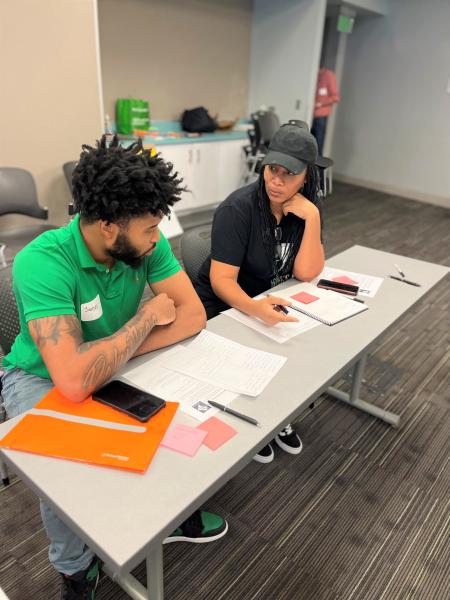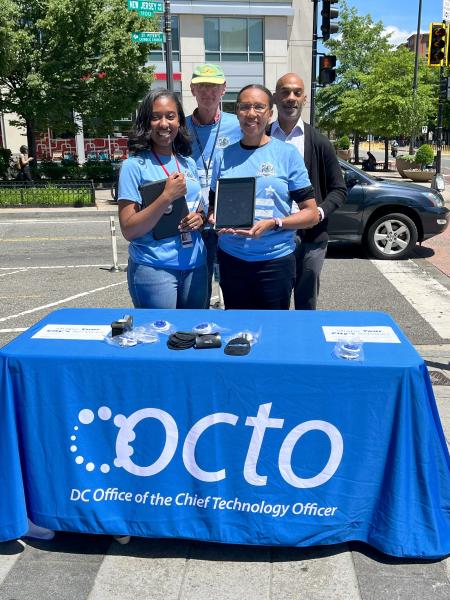Washington DC Innovation Team
The Washington DC Innovation Team (i-Team) is a dedicated group within the District of Columbia government that partners with agencies, local stakeholders, and residents to tackle the city’s most pressing challenges. Grounded in the belief that public services should be people-centered, the i-Team uses data, research, and creative design methods to reimagine how the District delivers programs, technology, and policy solutions.
Situated in the Office of the Chief Technology Officer (OCTO) and working closely with other agencies, the i-Team acts like an in-house consultancy—quickly diving into a high-priority issue, engaging everyone from front-line staff to local communities, then developing new ideas that can be tested in real-world settings. Once a solution is ready for citywide roll-out, the i-Team transitions it to the sponsoring agency, freeing the i-Team to tackle the next big challenge.
Our Goals

- Improve Resident Experience: Make government services more intuitive, accessible, and beneficial for all, regardless of background.
- Foster Digital Innovation: Introduce modern tools and data approaches that help agencies overcome outdated processes and silos.
- Strengthen Collaboration: Bring together different agencies and community partners to share ideas, co-create solutions, and learn from each other’s successes.
- Build Capacity: Transfer design and innovation skills to city staff, so that everyone in government is empowered to solve big problems.
Our Innovation Process

The i-Team follows a three-phase approach for each major project. We call these phases Understand, Generate, and Deliver.
- Understand the Problem
- Deep Research & Analysis: We start by collecting quantitative data and conducting interviews with city staff and residents. We uncover root causes, identify constraints, and map existing workflows to see what’s working—and what’s not.
- Inclusive Engagement: We hold listening sessions with community members—especially those historically left out of policy decisions—to ensure all viewpoints guide our early thinking.
- Generate Ideas
- Co-Creation & Brainstorming: In collaboration with agency teams and diverse stakeholders, we brainstorm new approaches. Because we focus on digital innovation, this might include re-engineering an online system, automating repetitive tasks, or creating a user-friendly web application.
- Prototyping & Testing: The i-Team develops early-stage prototypes—wireframes, mock-ups, or pilot programs—and tests them with real users. Rapid feedback loops help us refine ideas until they are feasible, intuitive, and impactful.
- Deliver Solutions
- Scaling Up: Once we have confidence in a solution, we partner with the sponsoring agency to implement citywide, ensuring the staff who will run the program have the tools and training needed.
- Measuring Results: We track success metrics—like fewer application errors, faster wait times, or better resident satisfaction. We share these findings across agencies to inspire future change and maintain public accountability.
- Transition & Sustain: When a project achieves its targets, we transfer full ownership to the relevant agency so they can continue performance management. This frees the i-Team to move on to a new mayoral priority or citywide challenge.
A Commitment to Sharing and Learning
Throughout each phase, we document lessons learned (reports, visuals, video) to share with other agencies and with the worldwide i-Team network. Part of the i-Team’s role is to demystify “innovation” and show how even large governments can adapt quickly, collaborate across departments, and keep residents at the heart of every decision.
About the Grant

The District’s i-Team initiative is generously supported by a three-year grant. This funding allows us to:
- Hire Specialists: Bring on UX designers, developers, and data experts to strengthen the city’s digital efforts.
- Prototype and Test: Enable flexible “try-it-and-learn” pilot projects for new digital solutions, from improving small-business licensing to rethinking resident benefit applications.
- Upskill Staff: Offer design-thinking workshops, training on advanced analytics, agile development, and modern government technology best practices.
- Engage Communities: Support inclusive outreach—workshops, focus groups, and user research—so solutions reflect DC’s diverse voices.
Under the grant agreement, the District will match some of the provided funds with new public or private resources. This ensures that the i-Team’s impact extends beyond the length of the grant, helping us sustain staff positions and keep innovating across agencies.
Have More Questions?
Please explore the rest of our website or email us at [[email protected]] for details about current projects, upcoming events, and ways to get involved. Together, we can make Washington, DC more responsive, more resilient, and more equitable for all.

